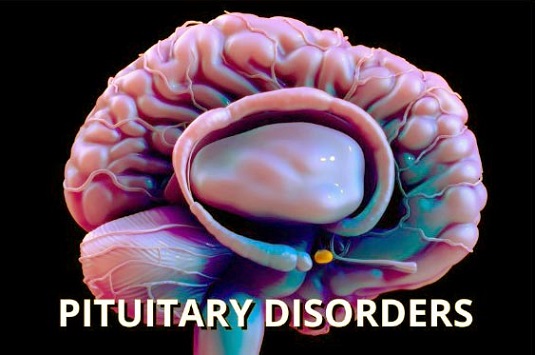Italian peer reviewed study warns that COVID-19 vaccines are triggering various pituitary gland disorders in many!
Nikhil Prasad Fact checked by:Thailand Medical News Team Aug 12, 2024 8 months, 1 week, 1 day, 4 hours, 23 minutes ago
Vaccine News: An alarming study from researchers at the University Hospital of Ferrara and the University of Ferrara, Italy, has raised concerns about the potential side effects of COVID-19 vaccines. According to the study, there is an emerging association between COVID-19 vaccinations and the onset of various pituitary gland disorders. Worryingly, because of the difficulty by doctors to diagnose these conditions unless by expensive medical-imaging methods and also because the symptoms often overlap other common conditions, most people are either being misdiagnosed or are unaware that their pituitary glands are infected till latent stages when conditions are serious.This
Vaccine News report will delve into the findings and implications of this study.
 COVID-19 vaccines are triggering various pituitary gland disorders in many!
Understanding the Pituitary Gland and Its Importance
COVID-19 vaccines are triggering various pituitary gland disorders in many!
Understanding the Pituitary Gland and Its Importance
The pituitary gland, often referred to as the "master gland," plays a crucial role in regulating vital body functions by controlling the endocrine system. It produces hormones that influence growth, metabolism, and reproduction. Given its significance, any dysfunction in the pituitary gland can lead to severe health issues, making the findings of this study particularly concerning.
Study Overview: COVID-19 Vaccination and Pituitary Disorders
The study conducted a systematic review of 23 case reports involving patients who developed pituitary diseases following COVID-19 vaccination. The researchers aimed to explore the epidemiology, clinical presentation, imaging findings, treatments, and outcomes of these cases. The study found that the most common pituitary disorders reported post-vaccination included hypophysitis (inflammation of the pituitary gland), pituitary apoplexy (bleeding or impaired blood supply to the pituitary gland), Syndrome of Inappropriate Antidiuretic Hormone Secretion (SIADH), and isolated adrenocorticotropic hormone (ACTH) deficiency.
Key Findings: A Closer Look at the Disorders
-Hypophysitis: The most frequently reported condition, hypophysitis, was observed in nine patients. This disorder often manifested with symptoms such as intense thirst, excessive urination, and fatigue. The study highlighted that hypophysitis occurred regardless of the vaccine type or dose number. Interestingly, it was more common in women, with a female-to-male ratio of 2:1. Imaging studies often revealed pituitary gland enlargement and thickening of the pituitary stalk.
-Pituitary Apoplexy: Six cases of pituitary apoplexy were reported, with an equal distribution between males and females. Patients typically experienced sudden, severe headaches, often accompanied by nausea, vomiting, and visual disturbances. Most cases required surgical intervention, particularly when the pituitary tumors exerted pressure on the optic chiasm, leading to vision problems.
-SIADH: Five patients de
veloped SIADH, a condition characterized by the excessive release of antidiuretic hormone, leading to water retention and low sodium levels. Symptoms included weakness, fatigue, and in severe cases, seizures and impaired consciousness. The condition was usually transient, with patients recovering after receiving appropriate fluid management.
-Isolated ACTH Deficiency: This rare condition was reported in two patients and is associated with a deficiency in the hormone responsible for stimulating the adrenal glands. Symptoms included severe fatigue, headache, nausea, and vomiting. Imaging studies showed an atrophic pituitary gland, indicating damage or shrinkage of the gland.
Potential Mechanisms: Why Are These Disorders Occurring?
The researchers proposed several potential mechanisms that might explain the onset of these pituitary disorders following COVID-19 vaccination. One hypothesis is molecular mimicry, where the immune system mistakenly attacks the body's own tissues due to similarities between vaccine components and human proteins.
Another possibility is the role of vaccine adjuvants, substances added to vaccines to enhance the immune response, which might trigger inflammatory reactions in the pituitary gland. Additionally, the presence of ACE2 receptors, which the SARS-CoV-2 virus uses to enter cells, in the hypothalamus-pituitary system could contribute to the development of these disorders.
Implications for Vaccine Safety
Despite these findings, the researchers emphasized that such cases are extremely rare, and the overall safety and efficacy of COVID-19 vaccines remain robust. The study underlined that while these pituitary disorders are concerning, they should not discourage individuals from getting vaccinated. Vaccination continues to be a crucial tool in controlling the spread of COVID-19 and preventing severe illness and death, they claim!
Clinical Management and Outcomes
The study provided insights into the clinical management of these pituitary disorders. Treatment varied depending on the specific condition and its severity. For instance, patients with hypophysitis often required hormone replacement therapy, such as glucocorticoids and thyroid hormones, to manage the deficiencies caused by the disorder. In cases of pituitary apoplexy, surgical intervention was sometimes necessary to alleviate symptoms and prevent further complications. Most patients responded well to treatment, although some required long-term hormone replacement therapy.
Conclusion
This study from Italy highlights a potential, albeit rare, association between COVID-19 vaccines and the development of pituitary disorders. The findings suggest that while these adverse events are uncommon, they warrant further investigation to better understand the underlying mechanisms and to develop guidelines for the early detection and management of these conditions. As always, individuals should consult with healthcare professionals regarding any concerns about vaccines and continue to follow public health recommendations.
The study findings were published in the peer-reviewed journal Pituitary (Spinger Link).
https://link.springer.com/article/10.1007/s11102-024-01402-2
For the latest
Vaccine News, keep on logging to Thailand Medical News.
Read Also:
https://www.thailandmedical.news/news/hong-kong-doctors-warn-that-covid-19-vaccines-can-cause-severe-inflammation-of-the-brain-s-blood-vessels
https://www.thailandmedical.news/news/breaking-covid-19-news-doctors-in-thailand-warn-that-covid-19-vaccines-could-possibly-lead-to-tumor-expansion-in-certain-cancers
